‘You have reached the offices of Families for Freedom. To reach Abraham Paulos press 1. To reach Cindy Martinez press 2’. The line is busy. I try another number, indicated on the website as the hot line.
‘Thank you for calling Families for Freedom. Please, dial 0 at this moment to speak with a representative.’
Busy again. I try to reach them for the next few days, calling only the first number; the other one is reserved for people threatened with deportation. I have memorized the female voice recorded on the voice machine that utters these few words, first in English, and then in Spanish: ‘You have reached the offices of Families for Freedom… Llamaron a la oficina de Familias por la libertad…’ Finally, Cindy answers. I make an appointment in the offices in Midtown Manhattan, a few hundred meters from Madison Square Garden, and two blocks from the Empire State Building.
In front of the entrance there is a scaffolding. Glass doors with number 35 are squeezed in between jewellery shops and a Western Union stand with MetroCards, sim cards and lottery tickets. I make a mistake in the elevator and exit on the sixth floor, into a karate school. Families for Freedom are one floor above, in room 702.
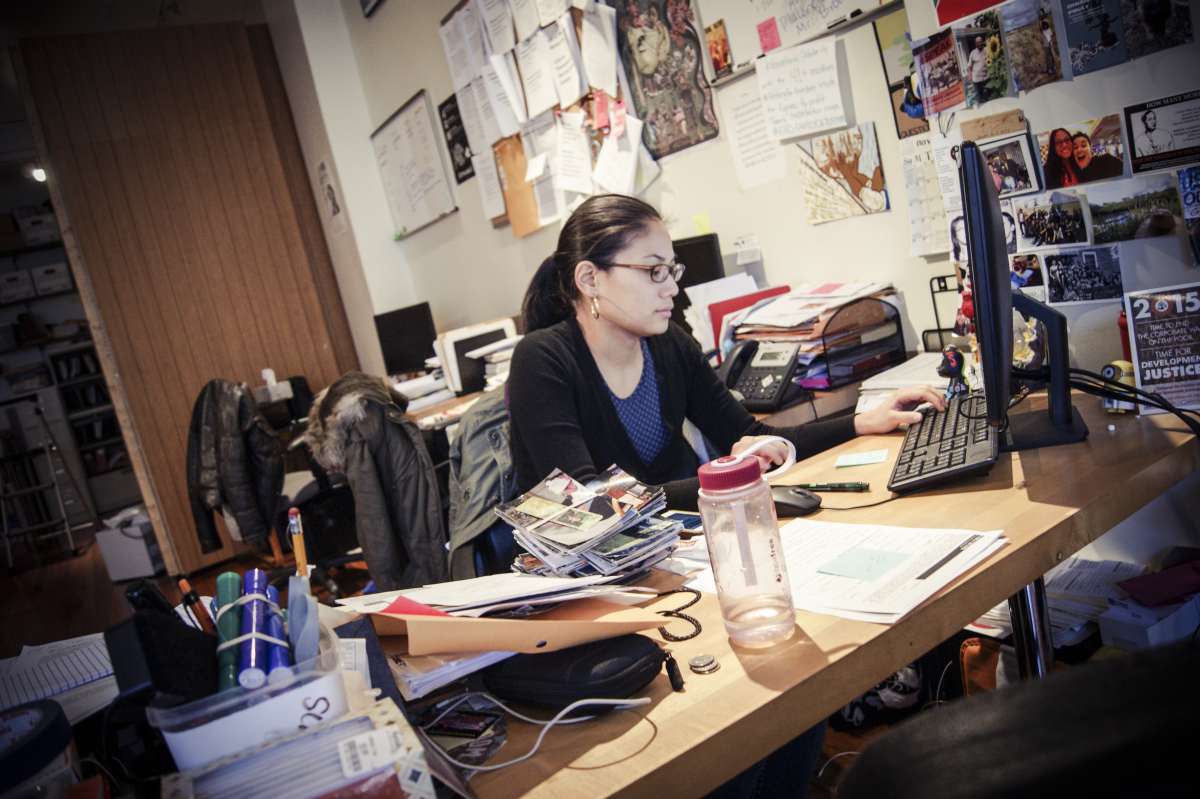
***
‘It’s not so easy to reach you,’ I drop taking my jacket off.
‘Yeah, you’re right. Last time I checked, after six months we had about 30,000 missed calls on that phone,’ says Abraham smiling, while Cindy and Cris are talking on the phone. ‘I’ll explain to you why in a minute. Just let me grab some water and we can talk’.
I have a while to look around the office. Several desks with piles of papers and a phone on each. Corkboards with pinned documents, bills, and addresses of courts, prisons and detention centres. Taped to the wall above Abraham’s desk is the first issue of The Black Panther newspaper published on April 25, 1967. “Why Was Denzil Dowel Killed,” reads the headline.
The front page story resembles the news about Trayvon Martin, Eric Garner, Michael Brown and other black victims of police brutality in recent years. “Danzil Dowell was unarmed so how can six bullet holes and shot gun blasts be considered ‘justifiable homicide?,’” Black Panthers were asking in ‘67. Abraham comes back with a jug of water and two glasses.
‘So, we have it on silent right now. But they don’t stop ringing,’ Abraham starts to explain, scratching his curly hair. ‘Altogether we can probably answer 20-30 calls a day. That’s why we have so many missed calls. Thousands a week. They can call us from every immigrant prison anywhere. And mostly folks are locked up and they have a lot of time, so they call.’
[easy-tweet tweet=”They can call us from every immigrant prison anywhere. @FamiliesFreedom”]
‘But you are not only hotline for inmates. Who would be calling Families for Freedom?’
‘If you are calling us, you probably don’t have a lawyer, you’re probably filing your case by yourself. You have a criminal conviction. You have probably been ordered deported or it’s just a matter of time for them to order you deported. And then, last but not least, you have probably been in prison for a very long time, at least a year. The lowest average is about a year, the highest average is probably 4-5 years. And we are a kind of a hotline for inmates,’ Abraham smiles. ‘I still remember when I called Families for Freedom. It was a really therapeutic conversation. The person that picked up the phone told me “Look, you know, I haven’t exactly gone through, what you’re going through, but my father went through that, and I think the system is unjust.” So, I was very open about it and I said ‘But I have convictions.’ And I heard it’s not a problem for them. It was surprising. I had called eight other immigrant rights groups and it was always very short conversation. ‘You have convictions? Sorry, we can’t help you.’’
‘So, the first time you called Families for Freedom you were on the other side of the phone?’ I’m making sure of that.
‘Yep, exactly. It was right after I got out of Rikers Island [the biggest city prison in the US, located between Queens and the mainland Bronx, New York. D.K.]. They told me I’m gonna get deported. Here, at Families everyone is either at risk of deportation, or has a loved one in such a situation. So I get out into the street and I started calling many organisations to help me out, but they all fobbed me off. And a friend of mine basically said “You should talk to this organisation, Families for Freedom”. At first I was scared.’
‘Why were you? You didn’t know anything about them at this time.’
Here, at Families everyone is either at risk of deportation, or has a loved one in such a situation.
‘No, I didn’t. But this name, man. It seems like a very right-wing name.’ He bursts into laughter and clutches his head. ‘But what could I do? I was desperate. You know, there is a joke that one of our founders said that they asked the members what should our name be, and one of them said: the Immigration Liberation Front. Everyone liked it, but they picked a different one.’
‘It would go perfectly with your logo: breaking chains. Can you tell me how it happened that you were in Rikers Island first, and now you are an executive director of a quite big organization?’
‘Sure. It is not my favourite memory, but it is a memory – quite an important one regarding what we do here in Families’
I propose that we can go a little further back in time. ‘You’re saying that they wanted to deport you. So it means you weren’t born in the US, right?’
‘No, I wasn’t. I’m a refugee. I was born in Sudan. I came to the US as a kid, and I grew up here pretty much my whole life. I grew up in Chicago in the ‘80s and ‘90s, in poverty. Which is synonymous in this country with having a criminal conviction. In my late teens to early twenties I got in trouble with the law a couple of times. So I have convictions. Then it got better. I got a scholarship. I am lucky, I went to really good schools, and I’m articulate. Then I moved to New York, to Brooklyn.’
‘So when exactly did they lock you up in Rikers Island? At the time when you were a teenager in Chicago? Isn’t it a New York prison, though?’ I’m asking, trying not to get lost in the story.
‘Wait for the plot twist,’ says Abe calmly. ‘So, I lived in Brooklyn and I was walking home after work, and I was working at a restaurant, beer garden actually. It was five years ago. I got off really late, two in the morning. And I’m one block away from my house and a very large man came up to me and asked for his money back. And I was like, “I don’t know what you are talking about. I don’t have your money”. The NYPD came and started to question me. Apparently he was robbed by three people. One of them hit him in the face, the other one took his money, and apparently there was a lookout. Obviously I didn’t hit him in the face. There was no blood on me. And second, I just got paid, so I have a lot of money on me, and obviously the guy was robbed for not a lot of money. So, finally they said “You were the lookout” and I went to the precinct. See, it’s a very normal story for a black man in America.’
‘And what was next? Bail? Jail?’
At court they gave me my charges. They were four felonies and two misdemeanours. What that means is about two to three years jail time.
‘At that time there wasn’t a program that they get your fingerprints in the precinct and take them to immigration. Now they do that. Even if you are a citizen, they do a double-check. So, I spent there a day, day and a half, and then I went to central booking, and court afterwards. At court they gave me my charges. They were four felonies and two misdemeanours. What that means is about two to three years jail time. Bail? Yeah, there was a bail. $2 500. I didn’t have it, so I ended up in Rikers Island. It was there that I was told for the first time that the government is going to try to deport me. I started talking with a fellow prisoner, and he told me that. All my life I thought I was a citizen, but it turned out that I wasn’t. I was sitting there and thinking: what is going to happen. Even though I had nothing to do with a robbery, and I would probably be found not guilty, and the case was going to get dismissed. But I could not have chance to defend myself, because I had priors, a criminal record that can get me deported.’
‘But you have refugee status, don’t you? Doesn’t it save you from deportation?’ I ask surprised.
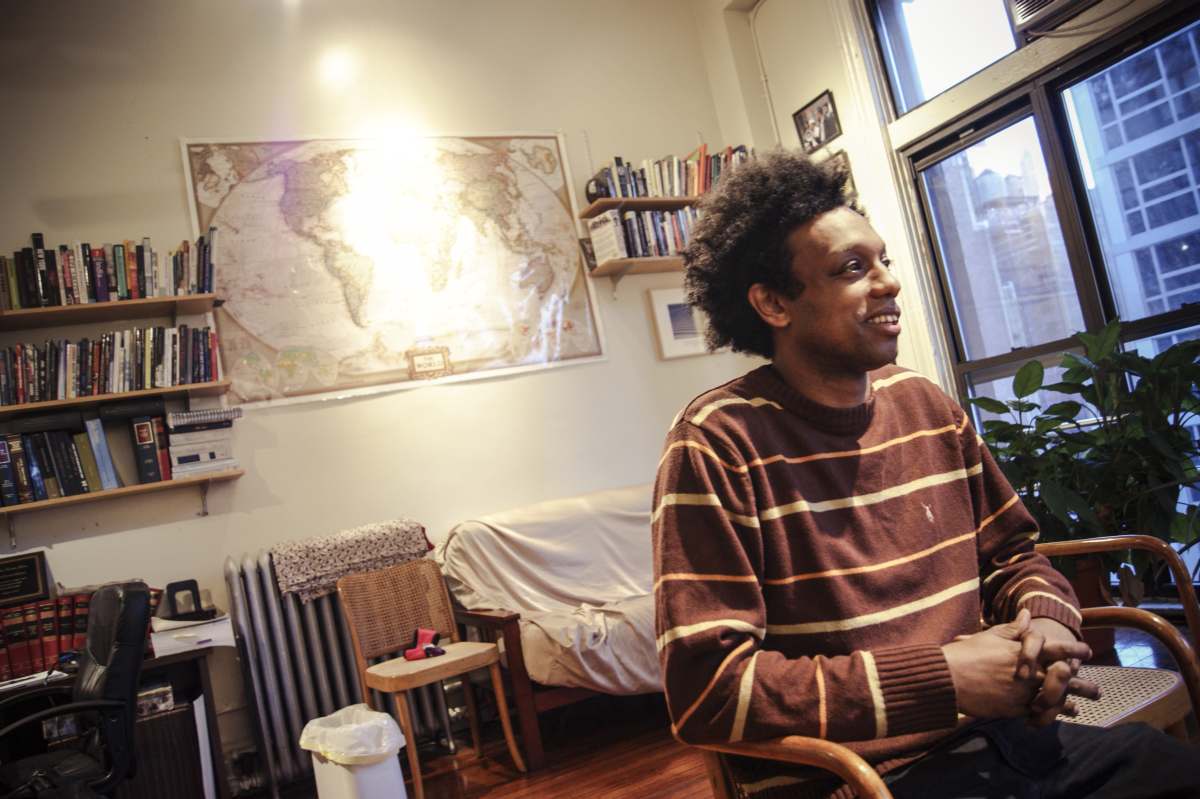
‘It doesn’t matter. Refugees can get deported. We see it. We see it happen a lot. Particularly for Palestinians, Somalians who are regularly deported from the United States. What happens after you get a criminal conviction is that you become deportable. So, what that means is that the US government will try to deport you back to your country. If the conditions there are still the same as they were when you became a refugee, they will try to see if there is another country that will take you. This rarely, rarely happens. But my cousin for example got deported to Ethiopia – country he had never been to. If you manage to stay here the next best thing is that you get stripped of your status, essentially. And you are then not considered a refugee, you are then considered someone that the government is trying to kick out, but doesn’t have a place to kick you out to. You do not really get a lot of the benefits. You have no path to citizenship. Every year you apply for a work authorization card. And you are pretty much in legal limbo.’
[easy-tweet tweet=”Refugees can get deported. @FamiliesFreedom see it happen a lot”]
‘You are sitting right now in your office in Midtown Manhattan, so I assume they didn’t deport you to Ethiopia.’
‘I got out from Rikers, because my friends were able to get the money together and post the bail. Funny thing is as soon as I walked out the building, the Department of Homeland Security officers were walking into the building. Not specifically for me, but this is the way they do business. They go to the jails and say “Who are all the non-citizens? Who are all the foreign borne people? We want to interview them.” And then they deport whoever they can.’
***
Next day I come to the offices in the early morning. Cindy promised to find some time for me before her work. She’s sitting behind the desk, wearing eyeglasses in black frames and a black T-shirt with a large “The Godfather” overprint. Her hair is tied in a ponytail. It is 9 am, so she looks more rested than yesterday evening. She’s been with Families for Freedom for two and a half years. She was born and raised in the Bronx, New York. She has American citizenship, Mexican roots and the least messy desk in the whole office.
‘Today will it ring all the time again?’ I ask.
‘For sure. But I have a half an hour for you. What do you want to know?’
‘Do you remember your first call?’
At that point I realized that some people are embarrassed, or scared to the point that they won’t even talk about deportation with their families.
‘Yeah, I still do. I remember the first call that I picked up was from the lady who only spoke Spanish. Her name was Samara. ICE [U.S. Immigration and Customs Enforcement] picked up her partner, I mean her ex-partner, they shared a child. He was undocumented and had a couple of criminal convictions. There wasn’t much what we could do. I knew he was going to get deported. So I just could be on the phone with her and talk, and break down the system for her, so she could understand. Some people are just there and they know it’s happening, but they just can’t understand why it’s happening. So, even though, eventually, that guy was deported, another day she called and she was like “Thank you, because when I had no one that understood me, you were the one person that I could always call.” At that point I realized that some people are embarrassed, or scared to the point that they won’t even talk about deportation with their families. But they can call us and no one will judge them here.’
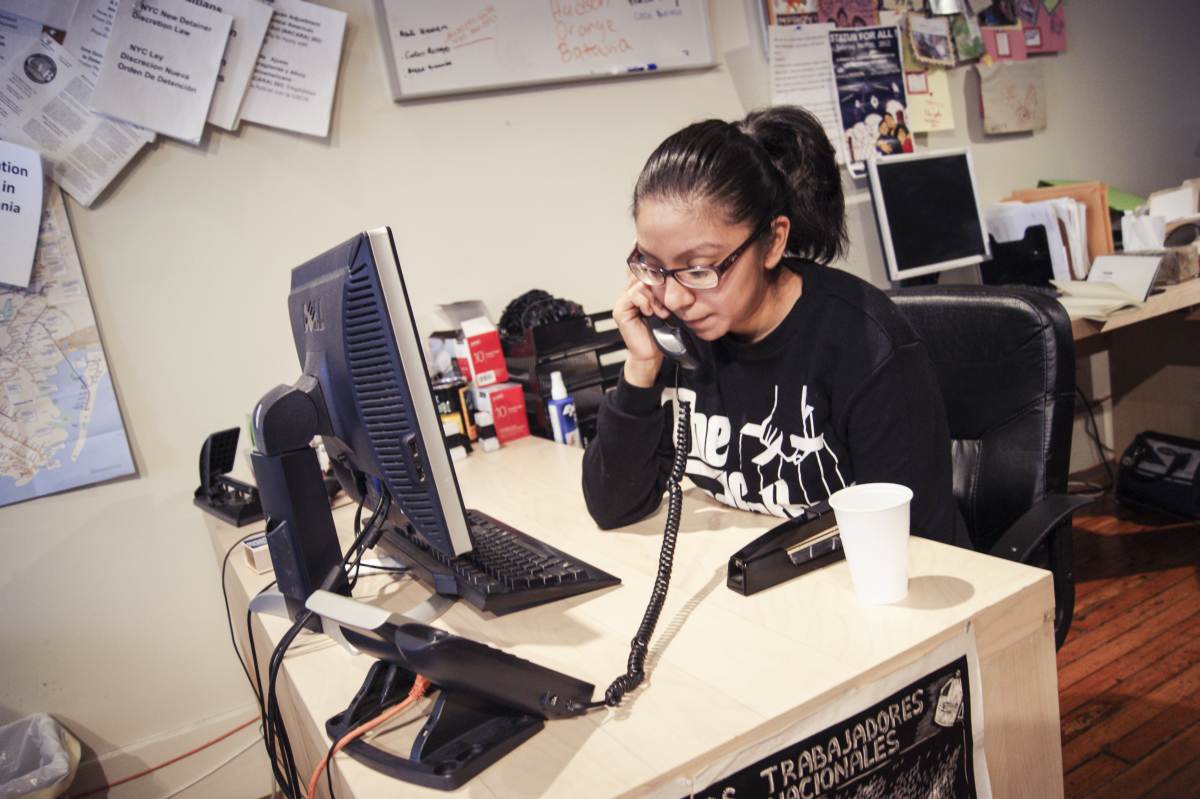
When there is a chance to stop deportation, Families for Freedom organize campaigns. Cindy is responsible for coordinating them.
[easy-tweet tweet=”Deportees can call us and no one will judge them here.”]
‘The main part is always having them released because they’re locked up. Then we can think about other things. But to get there we need to work out the case. Collect tons of documents, sometimes post bail, and sometimes reach the media. Last week, for example, me and the family went to the Liberian consulate in New York. We’re trying to figure out who issued a travel document for this individual from Liberia that immigration wants deported. You can’t proceed with deportation without a travel document. The point is that the Liberian consulate hasn’t issued such a document for more than a year. So, who has, right?’
Cindy suspects that the travel document could have been simply forged by the immigrations. When I asked Abraham about ICE forging documents, he said that it is a very serious allegation, but they do have justified fear that it happens. By the end of September 2015 they published a report where similar cases are mentioned. The case of Carlos from Ecuador is one of them: “On October 10, 2014, ICE officers deported Carlos using a sheet of paper which looked like a copy of the ID page of a passport. When Carlos arrived in Guayaquil, Ecuador, the Ecuadorian officials confiscated the sheet of paper and told Carlos that it was a false travel document. At that point, Carlos had no identity documents and only six dollars in his pocket.”
‘No matter what the case is about, we need the family or the loved ones to be active. It wouldn’t be possible to have a campaign if family is not involved. That’s how we run, because we only have three staff members, and that’s not a lot,’ Cindy points out.
‘You also came to Families for Freedom straight from Rikers Island?’
‘Not really,’ Cindy smiles. ‘I was in school. I was doing an internship. My family has been affected by deportation, but I didn’t know much about it. When my godmother had just gotten deported I wanted to get more knowledge and I came as an intern. I did a lot of volunteer work and an internship here, and then I got a phone call from my sister. With a trembling voice she said that her husband got picked up and there is a threat he can get deported. And when he was calling my sister from jail, the officer standing outside was telling him: ‘Why you are bothering calling her? You’re going to get deported tomorrow. You’re going to be brought on plane to Mexico. You’ll see.’
When my godmother had just gotten deported I wanted to get more knowledge and I came as an intern.
Cindy’s sister came to the offices in Manhattan. The Families for Freedom team broke down the system for her. They called wherever they had to and it turned out that things are not so catastrophic. No immigration officer had even come to pick him up yet. It was just the cops. But after he got arrested, immigrations took interest in him and he had an immigration hold. The first court hearing was to take place a few days after the arrest.
‘I was sitting in the court with my sister, waiting for her husband and the judge. After an hour I approached one of the police officers there, trying to get to know when he is going to be seen, because we were waiting for a long time. Then another police officer says “There is nothing you can do. He is going to come see the judge and when he sees the judge you’re going to wave goodbye, because they’re going to put him on the plane to Mexico on the next day”. Can you imagine that? We just stood there and we were like, but how is that possible? Then we waited next few hours. I saw that the hearing of another Mexican family had finished, and this family passed by. I couldn’t wait any longer, so I stood up and approached another police officer. I explain to him what the problem is, and he goes “But he just passed”. And I was like, that’s not my family, that’s not my loved one, what are you saying? He assumed that we were together, because we were both Mexican, and all Mexicans look the same and are related, right?’
He assumed that we were together, because we were both Mexican, and all Mexicans look the same and are related, right?
‘How did it all end up?’
‘Turned out that my brother-in-law had seen judge already ten hours before, in the morning. So, he spent 11 days in jail. His case got dismissed, it was disorderly conduct which isn’t like a felony, it’s a violation. It doesn’t carry immigration consequences, but he had a detainer hold, so this gives immigration 48 hours to pick you up. But they didn’t come after all.’
I look at my watch and see that our half an hour is coming to an end. Cindy, usually calm and cool-headed, got seriously pissed off with the story from the court room. So, I ask her what else pisses her off.
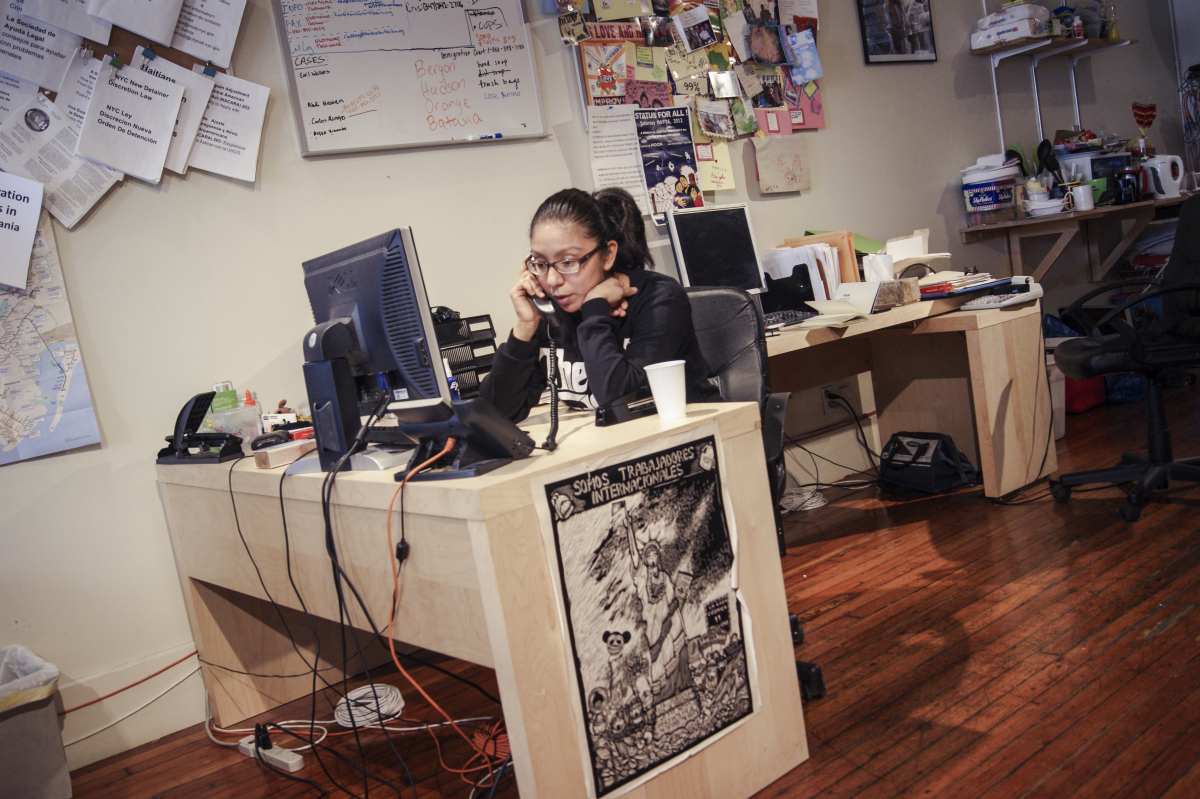
‘I don’t know. People from immigrant rights groups that have a problem with us defending felons, I guess. This dichotomy – good immigrant, bad immigrant, like if people with convictions shouldn’t have any rights. It pisses me off. And Obama’s speech from 2014 when he said similar things irritates me as well.’
***
November 20th 2014. Barack Obama stands in the entrance to the East Room in the White House, between the Stars and Stripes and presidential flag. He leans over the podium and begins his speech:
But today, our immigration system is broken – and everybody knows it.
‘My fellow Americans, tonight, I’d like to talk with you about immigration. For more than 200 years, our tradition of welcoming immigrants from around the world has given us a tremendous advantage over other nations. It’s kept us youthful, dynamic, and entrepreneurial. It has shaped our character as a people with limitless possibilities – people not trapped by our past, but able to remake ourselves as we choose. But today, our immigration system is broken – and everybody knows it. Families who enter our country the right way and play by the rules watch others flout the rules.’
Then for the next few minutes he goes on about the security of American people. About being good, and not being bad – which means being a high-skilled worker, graduate, or an entrepreneur, and not crossing the border illegally. If you play by the rules, you can come out of shadows, he promises. Finally he arrives at the bottom line that is quoted for the next few days by all American newspapers: ‘Even as we are a nation of immigrants, we’re also a nation of laws. Undocumented workers broke our immigration laws, and I believe that they must be held accountable – especially those who may be dangerous. That’s why, over the past six years, deportations of criminals are up 80 percent. And that’s why we’re going to keep focusing enforcement resources on actual threats to our security. Felons, not families. Criminals, not children. Gang members, not a mom who’s working hard to provide for her kids.’
***
‘And how do you like this speech?’
[easy-tweet tweet=”Felons have families too! @POTUS”]
‘Felons have families too!’ says Cris irritated. I finally managed to catch her on her break. Even when she gets upset, she speaks in a calm and quiet voice. But I know she becomes transformed during protests. I saw her in a photo, marching confidently in the first row. Cris Hilo is a descendent of Filipino migrants, and she is originally from Los Angeles, California, where most of her family is located. In the last ten years she has tackled discrimination of Arabs and Muslims in Brooklyn, worked with victims of human trafficking, and organized union campaigns with nurses’ and teachers’ unions. She does not only pick up the phone, but she calls a lot – she is responsible for keeping in touch with more than a hundred of Families for Freedom members.
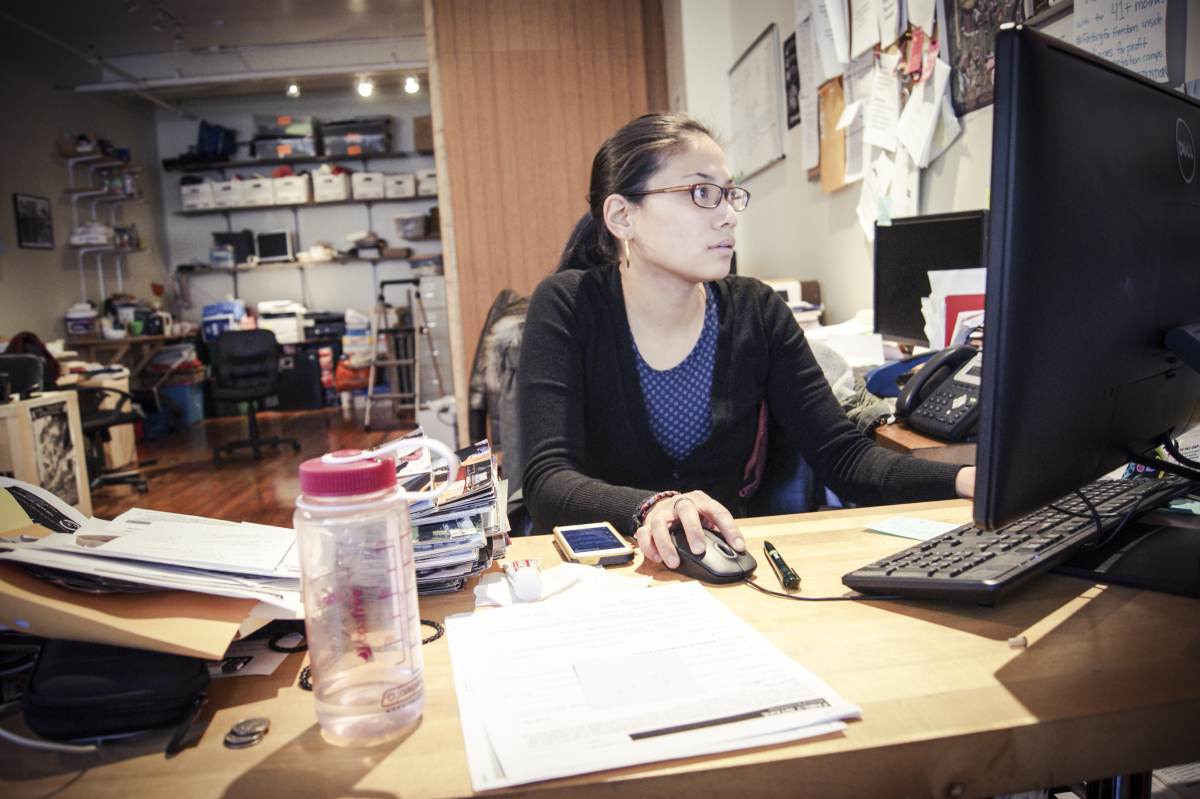
‘Most of the people would be like “Yeah, yeah, get rid of these people.” They think that no one would miss them. But for all of us that work with their families it looks a bit different. We know that there is no bad, and there is no good, it’s just that they made a mistake,’ Cris adds.
We know that there is no bad, and there is no good, it’s just that they made a mistake
‘Exactly! Felons have families too!’ Cindy repeats. ‘They don’t matter, or what? Sometimes you can see these other groups, they have on their signs: “We are not criminals, don’t deport us. We have a right to stay.” A person with a conviction has a right to stay too. Some people say that only thing we do here is protecting rapists and murderers. It’s like the first thing people think when they think about deportees – that they are rapists, murderers. They don’t even realize that every small conviction like possession of marihuana can get you deported.’
‘OK, but let’s even say that we defend paedophiles,’ Abraham breaks in. ‘How is deporting someone to Mexico or Jamaica going to solve this problem? Deportation is not a solution. And Jamaica for example should accept all paedophiles right now? That’s colonization and that’s imperialism.’
[easy-tweet tweet=”A person with a conviction has a right to stay too.”]
‘If I understood correctly, in New York City only felons get deported, right?’ I ask.
‘Practically, yes, that’s true. New York is considered as a sanctuary city,’ Abraham replies. ‘It’s not Arizona. ICE will not raid a Deli and say that all the undocumented people are gonna be taken away. I mean, New York would probably stop. But if you have a conviction it’s different. You have something to worry about. When it comes to actual deportations and who is getting deported from the US in the past two-three years, we are the majority – folks with criminal convictions. In 2002 people with criminal convictions were probably 20% of people that were getting deported. In 2013 it reached 60%. So, it’s about us. We should be asked for the opinion.’
When I first met Abraham, even before I asked him any questions he told me few words about Families for Freedom. One of the things he wanted to make sure that people understand is that their group is based in the human rights framework. Later I heard the same thing from Cris: ‘Do you really want to be deporting anybody back to the different countries? Here in Families we believe in human rights, and as a human everyone has a right to mobility. No one should be forcing you to go here, there, or anywhere. But now, we have seen in the past many years that millions of people have been deported and it’s just because of their immigration status or their criminal conviction’
But that’s not the only criticism of Obama’s approach to immigration that Abraham raises.
‘If you look at the early ‘90s. Back then it was like 20-30 thousand people getting deported a year. Now, what you are looking at is half a million people a year, right? Half a million people leaving this country in anger and resentment. It’s not like it’s not gonna come back.’
‘What you mean by that?’
Half a million people a year leaves this country in anger and resentment. It’s not like it’s not gonna come back.
‘Let me give you an example. There was a young man who basically lived here his whole life, from Jamaica. He grew up in a ghetto, was in the military for a bit, got out. We fought really, really hard for him, but eventually he got deported. And I started to talk with him when he was in Jamaica. In passing, he just basically said “Yeah, the US is going to pay for this.” When you go through deportation proceedings, it is not like you versus some entity. It is really you versus federal government – and that’s what it says on this piece of paper. You end up in a place that you have never been to, you don’t know the culture, you don’t know the language. Only thing you have is your anger and resentment. They are only human beings, and their anger has to be geared into something. And that’s half a million people a year. I leave it up to your imagination how they feel.’
***
I pack my things. I take a look round the office for the last time. On the doors I spot a poster I missed before. It looks like a Dunkin’ Donuts billboard. But instead of “America Runs on Dunkin’” it has pictograms of workers on it and it reads “America Runs on Immigrants”. It’s hard to disagree with that.
I skim through my notes and I see that there is one more question that I have to ask Abraham: ‘Abe, how did the robbery case end?’

I just had a daughter. So you know, this thing’s become more real as I get older.
‘My criminal stuff. Everything I did it’s all done. Charges were dropped. Immigration and Deportation is a different story. I haven’t been in deportation proceedings yet. But I was speaking with lawyers and they say it seems like I’m deportable. So, there is this risk that I do face. Why they haven’t come yet? I don’t really now. But in the meantime I’m trying to organize. On a personal level, I have to tell you that I have a fear. I just had a daughter. So you know, this thing’s become more real as I get older. It’s important to have this sort of emergency plan. A lot of times it’s five in the morning, they come, wake up the kids, and it’s done. It’s your last memory from the United States.’
 This work by Dawid Krawczyk is licensed under a Creative Commons Attribution-NonCommercial-ShareAlike 4.0 International License.
This work by Dawid Krawczyk is licensed under a Creative Commons Attribution-NonCommercial-ShareAlike 4.0 International License.
![Political Critique [DISCONTINUED]](http://politicalcritique.org/wp-content/uploads/2015/09/Political-Critique-LOGO.png)
![Political Critique [DISCONTINUED]](http://politicalcritique.org/wp-content/uploads/2015/09/Political-Critique-LOGO-2.png)
Good report. From Trump to Obama there is really no difference when it comes to deportations in the US. A few miles away from UN HQ in Manhattan ICE works it evil in flagrant violation of human rights declarations. Words are fine, but what really matters are actions (that is, bodies) to defend the powerless as this report demonstrates. The power structure of the US is responsible for the devastation of the Mexican agricultural economy via NAFTA and the underworld drug culture of Central America (and beyond) thrives because of the US market, and yet when the victims of these circumstances flee to the US they find no refuge. And where are the US political leaders who expose this outrage? It isn’t simply that they are cowards, they are tools. It as if, in the US, Justitia has been relieved of her scales and provided a larger sword. The system here, as in some many other places, in the US and abroad, is broken as Obama says; unfortunately, his words, just like those of European politicians, are a veil hiding the sword that wields injustice.